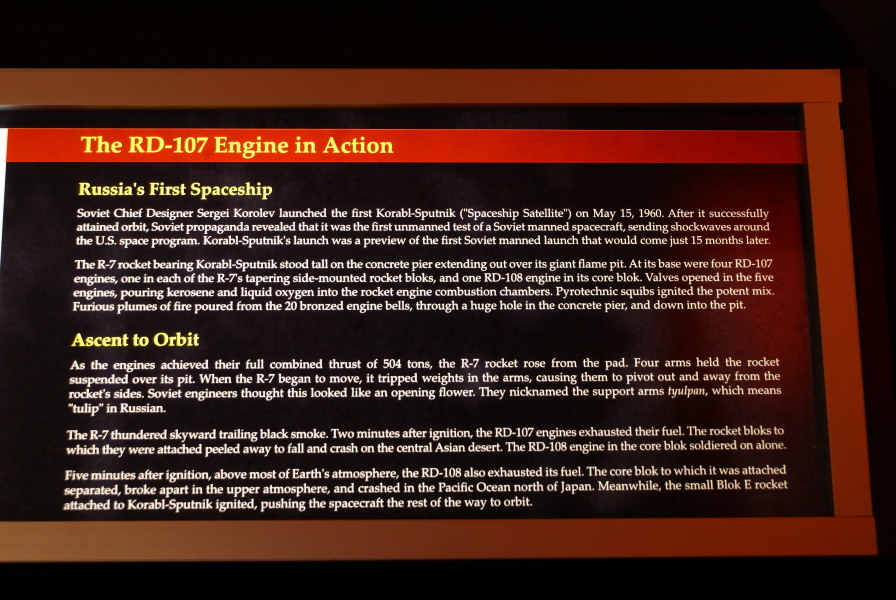| Prev |
heroicrelics.org Kansas Cosmosphere Site Index RD-107 Engine Gallery |
Next |
dsca0369.jpg
One of the signs accompanying the engine. It reads
The RD-107 Engine in Action
Russia's First Spaceship
Soviet Chief Designer Sergei Korolev launched the first Korabl-Sputnik ("Spaceship Satellite") on May 15, 1960. After it successfully attained orbit, Soviet propaganda revealed that it was the first unmanned test of a Soviet manned spacecraft, sending shockwaves around the U.S. space program. Korabl-Sputnik's launch was a preview of the first Soviet manned launch that would come just 15 months later.
The R-7 rocket bearing Korabl-Sputnik stood tall on the concrete pier extending out over its giant flame pit. At its base were four RD-107 engines, one in each of the R-7's tapering side-mounted rocket bloks, and one RD-108 engine in its core blok. Valves opened in the five engines, poring kerosene and liquid oxygen into the rocket engine thrust chambers. Pyrotechnic squibs ignited the potent mix. Furious plumes of fire poured from 20 bronzed engine bells, through a huge hole in the concrete pier, and down into the pit.
Ascent to Orbit
As the engines achieved their full combined thrust of 504 tons, the R-7 rocket rose from the pad. Four arms held the rocket suspended over its pit. When the R-7 began to move, it tripped weights in the arms, causing them to pivot out and away from the rocket's sides. Soviet engineers thought this looked like an opening flower. They nicknamed the support arms tyulpan, which means "tulip" in Russian.
The R-7 thundered skyward trailing black smoke. Two minutes after ignition, the RD-107 engines exhausted their fuel. The rocket bloks to which they were attached peeled away to fall and crash on the central Asian desert. The RD-108 engine in the core blok soldiered on alone.
Five minutes after ignition, above most of Earth's atmosphere, the RD-108 also exhausted its fuel. The core blok to which it was attached separated, broke apart in the upper atmosphere, and crashed into the Pacific Ocean north of Japan. Meanwhile, the small Blok E rocket attached to Korabl-Sputnik ignited, pushing the spacecraft the rest of the way to orbit.

| Time picture taken | Sat Dec 7 11:13:38 2013 |
| Location picture taken |
Outside the Blockhouse Gallery Hall of Space Kansas Cosmosphere Hutchinson, KS |
| Prev |
heroicrelics.org Kansas Cosmosphere Site Index RD-107 Engine Gallery |
Next |